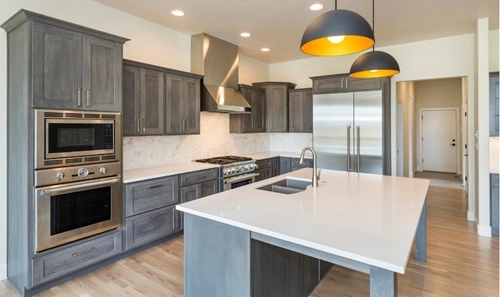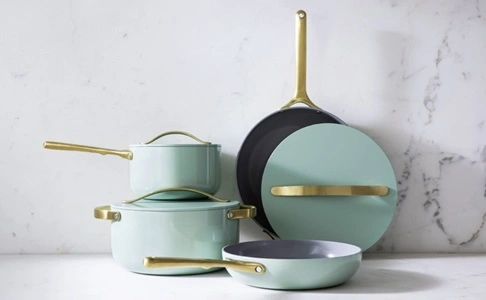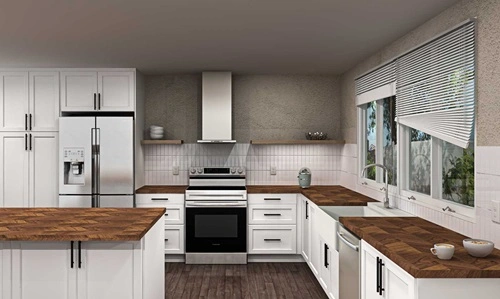When it comes to modern kitchen and bathroom design, quartz countertops are a popular choice for homeowners and designers alike. Known for their durability, aesthetic versatility, and low-maintenance qualities, quartz countertops offer a premium look that rivals natural stone. However, like any material, quartz has its strengths and weaknesses.
This article explores the pros and cons of quartz countertops, providing an in-depth guide to help you decide if they’re the right fit for your home.
What Are Quartz Countertops?

Quartz countertops are engineered stone surfaces made from a combination of 90–95% ground natural quartz and 5–10% resins, polymers, and pigments. This manufacturing process creates a non-porous, durable, and customizable material that is ideal for countertops. Available in a wide range of colors and patterns, quartz mimics the look of natural stone like marble or granite while offering superior practicality.
The Pros of Quartz Countertops
1. Durability
Quartz countertops are incredibly durable, making them a long-lasting choice for high-traffic areas like kitchens and bathrooms. Unlike natural stone, quartz is less prone to cracking or chipping, thanks to its engineered composition. It can withstand daily wear and tear with ease.
2. Low Maintenance
One of the standout features of quartz countertops is their low-maintenance nature. Because quartz is non-porous, it does not require sealing, unlike materials like granite or marble. A simple wipe-down with soap and water is enough to keep it clean and looking new.
3. Non-Porous Surface
The non-porous surface of quartz countertops offers two major advantages:
- Stain Resistance: Quartz resists staining from liquids like wine, coffee, and oils, which can easily penetrate porous materials like granite.
- Hygiene: Its non-porous nature prevents bacteria, mold, and mildew from seeping into the surface, making it a safe and sanitary option for food preparation areas.
4. Aesthetic Versatility
Quartz countertops are available in a vast array of colors, patterns, and finishes. Whether you prefer a sleek, modern look or something that mimics the natural veining of marble, quartz can be customized to suit your design preferences.
5. Consistency in Appearance
Unlike natural stone, which can have unpredictable veining and color variations, quartz offers consistent patterns and colors. This makes it easier to achieve a uniform look, especially for larger surfaces or multiple installations.
6. Scratch Resistance
Quartz countertops are highly resistant to scratches, making them a practical choice for busy kitchens. However, while they are scratch-resistant, they are not scratch-proof, so using cutting boards is still recommended.
7. Eco-Friendly Options
Many quartz countertop manufacturers use recycled materials in their products, making quartz an eco-friendly choice for environmentally conscious homeowners. Additionally, since quartz is engineered, it does not require quarrying in the same way natural stone does.
8. Wide Range of Brands and Price Points
Quartz countertops are available from a variety of brands, such as Caesarstone, Silestone, and Cambria, offering options to fit different budgets and design needs.
9. Heat Resistance
While not entirely heatproof, quartz countertops can resist moderate levels of heat, such as a hot plate or pan. This makes them more durable than laminate or solid surface countertops in terms of heat exposure.
10. Long Lifespan
With proper care, quartz countertops can last for decades without losing their appearance or functionality. Their durability and resistance to common issues like staining and cracking make them a worthwhile investment.
The Cons of Quartz Countertops
1. High Initial Cost
Quartz countertops are a premium material, and their price reflects that. While they can cost less than some natural stones like marble, they are generally more expensive than options like laminate or butcher block. The cost can range from $50 to $200 per square foot, depending on the brand, color, and installation requirements.
2. Not Completely Heatproof
Although quartz is heat-resistant, excessive heat can damage the resin binders in its composition, causing discoloration or warping. Placing hot pots or pans directly on the surface is not recommended, and the use of trivets or heat pads is advised.
3. Heavy Weight
Quartz countertops are very heavy, which can make installation more challenging. Proper structural support is essential, particularly for large slabs or overhangs. Professional installation is typically required, which adds to the overall cost.
4. Lack of Natural Stone Authenticity
While quartz can mimic the look of natural stone, some homeowners prefer the unique imperfections and organic feel of materials like granite or marble. Quartz’s uniformity and engineered appearance may not appeal to those seeking a more natural aesthetic.
5. Susceptibility to UV Damage
Prolonged exposure to direct sunlight can cause quartz countertops to fade or discolor over time. This makes them less suitable for outdoor kitchens or areas with large windows that let in significant natural light.
6. Visible Seams
Although quartz slabs are consistent in appearance, seams can still be visible in larger installations or when multiple pieces are joined together. Skilled installation can minimize this issue, but it may still be noticeable depending on the color and pattern of the quartz.
7. Limited DIY Installation
Due to its weight and the need for precise cutting and fitting, quartz countertops are not a DIY-friendly option. Professional installation is required, which increases the overall cost of the project.
8. Chemical Sensitivity
While quartz is resistant to stains and scratches, harsh chemicals and abrasive cleaners can damage its surface. Cleaning products containing bleach, ammonia, or high acidity should be avoided, as they can erode the resin and dull the finish.
9. Not as Heat-Resistant as Granite
Compared to natural stone like granite, quartz has a lower tolerance for high heat. This means it may not be the best choice for homeowners who frequently cook with high-heat appliances.
10. Limited Edge Customization
While quartz offers a variety of edge profiles, it may not have as many intricate edge options as natural stone due to its engineered nature.
Who Should Consider Quartz Countertops?
Quartz countertops are an excellent choice for:
- Homeowners seeking a durable, low-maintenance surface for kitchens or bathrooms.
- Individuals who prefer a uniform and consistent appearance.
- Families concerned about hygiene and stain resistance.
- Those willing to invest in a premium material for long-term value.
However, they may not be ideal for homeowners on a tight budget or those seeking the natural variation and uniqueness of real stone.
Tips for Maintaining Quartz Countertops
- Clean Spills Promptly: Use a soft cloth and mild detergent to clean spills and prevent potential staining.
- Avoid Abrasive Cleaners: Stick to gentle, non-abrasive cleaning products to maintain the surface’s finish.
- Use Cutting Boards: Protect the surface from scratches by using cutting boards for food preparation.
- Protect from Heat: Always use trivets or heat pads under hot cookware to avoid heat damage.
- Regular Dusting: Wipe the surface regularly with a microfiber cloth to maintain its shine.
Conclusion
Quartz countertops offer an attractive combination of durability, versatility, and low-maintenance qualities, making them a popular choice for modern homes. Their non-porous surface, stain resistance, and wide range of design options make them both practical and stylish. However, the higher initial cost, sensitivity to heat, and engineered appearance may not suit everyone’s preferences or budget.
By carefully weighing the pros and cons of quartz countertops, you can determine whether they align with your needs and lifestyle. With proper care, quartz countertops can provide a long-lasting and beautiful surface that enhances the functionality and aesthetics of your kitchen or bathroom.



